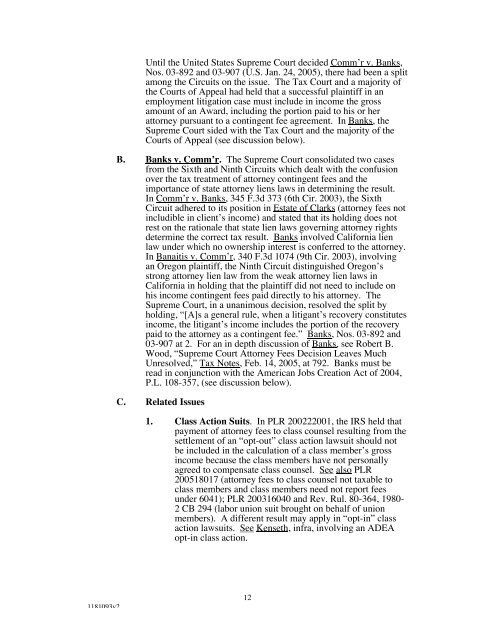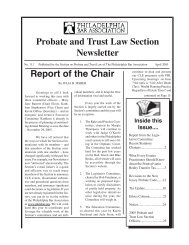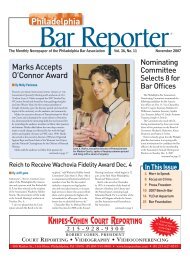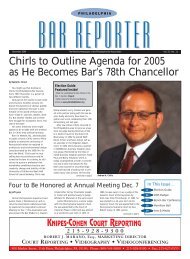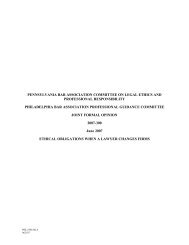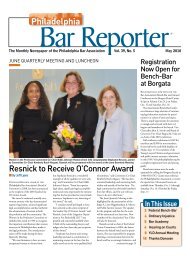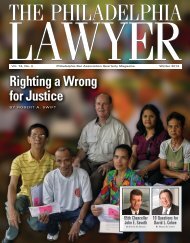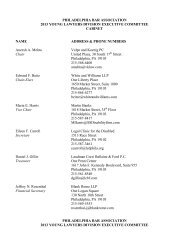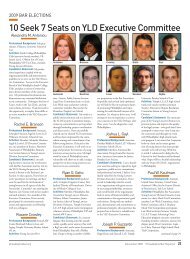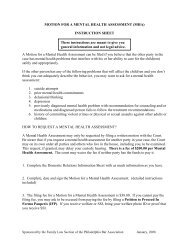Tax Aspects of Litigation Awards and Settlements - Philadelphia Bar ...
Tax Aspects of Litigation Awards and Settlements - Philadelphia Bar ...
Tax Aspects of Litigation Awards and Settlements - Philadelphia Bar ...
You also want an ePaper? Increase the reach of your titles
YUMPU automatically turns print PDFs into web optimized ePapers that Google loves.
Until the United States Supreme Court decided Comm’r v. Banks,<br />
Nos. 03-892 <strong>and</strong> 03-907 (U.S. Jan. 24, 2005), there had been a split<br />
among the Circuits on the issue. The <strong>Tax</strong> Court <strong>and</strong> a majority <strong>of</strong><br />
the Courts <strong>of</strong> Appeal had held that a successful plaintiff in an<br />
employment litigation case must include in income the gross<br />
amount <strong>of</strong> an Award, including the portion paid to his or her<br />
attorney pursuant to a contingent fee agreement. In Banks, the<br />
Supreme Court sided with the <strong>Tax</strong> Court <strong>and</strong> the majority <strong>of</strong> the<br />
Courts <strong>of</strong> Appeal (see discussion below).<br />
B. Banks v. Comm’r. The Supreme Court consolidated two cases<br />
from the Sixth <strong>and</strong> Ninth Circuits which dealt with the confusion<br />
over the tax treatment <strong>of</strong> attorney contingent fees <strong>and</strong> the<br />
importance <strong>of</strong> state attorney liens laws in determining the result.<br />
In Comm’r v. Banks, 345 F.3d 373 (6th Cir. 2003), the Sixth<br />
Circuit adhered to its position in Estate <strong>of</strong> Clarks (attorney fees not<br />
includible in client’s income) <strong>and</strong> stated that its holding does not<br />
rest on the rationale that state lien laws governing attorney rights<br />
determine the correct tax result. Banks involved California lien<br />
law under which no ownership interest is conferred to the attorney.<br />
In Banaitis v. Comm’r, 340 F.3d 1074 (9th Cir. 2003), involving<br />
an Oregon plaintiff, the Ninth Circuit distinguished Oregon’s<br />
strong attorney lien law from the weak attorney lien laws in<br />
California in holding that the plaintiff did not need to include on<br />
his income contingent fees paid directly to his attorney. The<br />
Supreme Court, in a unanimous decision, resolved the split by<br />
holding, “[A]s a general rule, when a litigant’s recovery constitutes<br />
income, the litigant’s income includes the portion <strong>of</strong> the recovery<br />
paid to the attorney as a contingent fee.” Banks, Nos. 03-892 <strong>and</strong><br />
03-907 at 2. For an in depth discussion <strong>of</strong> Banks, see Robert B.<br />
Wood, “Supreme Court Attorney Fees Decision Leaves Much<br />
Unresolved,” <strong>Tax</strong> Notes, Feb. 14, 2005, at 792. Banks must be<br />
read in conjunction with the American Jobs Creation Act <strong>of</strong> 2004,<br />
P.L. 108-357, (see discussion below).<br />
C. Related Issues<br />
1. Class Action Suits. In PLR 200222001, the IRS held that<br />
payment <strong>of</strong> attorney fees to class counsel resulting from the<br />
settlement <strong>of</strong> an “opt-out” class action lawsuit should not<br />
be included in the calculation <strong>of</strong> a class member’s gross<br />
income because the class members have not personally<br />
agreed to compensate class counsel. See also PLR<br />
200518017 (attorney fees to class counsel not taxable to<br />
class members <strong>and</strong> class members need not report fees<br />
under 6041); PLR 200316040 <strong>and</strong> Rev. Rul. 80-364, 1980-<br />
2 CB 294 (labor union suit brought on behalf <strong>of</strong> union<br />
members). A different result may apply in “opt-in” class<br />
action lawsuits. See Kenseth, infra, involving an ADEA<br />
opt-in class action.<br />
1181093v2<br />
12


